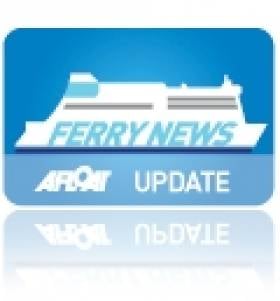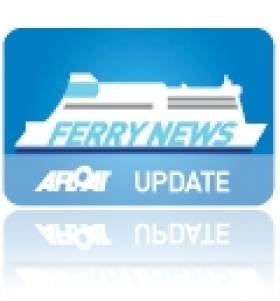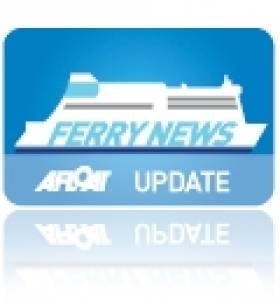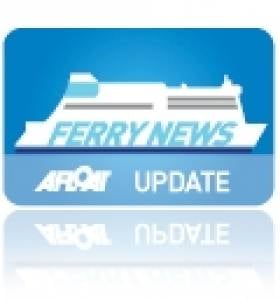Displaying items by tag: Norbank
Ferry For Falmouth
#FERRY NEWS – European Endeavour (2000/ 24,046grt), the largest of three ferries running for P&O's Dublin-Liverpool route departed from the capital's port this afternoon bound for A&P Groups dry-dock facility in Falmouth, writes Jehan Ashmore.
The former Dover-Calais serving ferry started working on the Irish Sea on a full-time basis last year as previously reported. Her fleetmates are the 17,000 tonnes sisters Norbank and Norbay.
The trio of ro-pax ferries are to a design where freight is predominately the main cargo and passenger capacity is reduced considerably compared to most conventional ferries. European Endeavour can handle 130 lorries and accommodate 210 passengers whereas her fleetmates are the reverse with greater freight capacity for 150 freight units and a reduced capacity for 114 passengers.
P&O are the only ferry firm on the route providing passenger and car ferry service though they do not cater for 'foot' passengers. Their rivals Seatruck Ferries offer the only dedicated freight-operation on a network of routes on the north Irish Sea including the Liffey-Mersey link, where in recent months new tonnage has entered service.
Irish Sea 'Racehorse' Returns
Dawn Merchant and Brave Merchant represented the first pair of the 'Racehorse' class quartet of ro-pax sisters commissioned for the Cenargo Group. The quartet were built by Spainish shipbuilders Astilleros Espanoles SA in Seville, noting the first pair at 22,046grt where slightly smaller in tonnage terms compared to their 22,215grt counterparts Midnight Merchant and Northern Merchant. Upon delivery in 2000 the second pair were chartered to Norfolkline's Dover-Dunkerque route.
With a 130 truck capacity the Norman Trader can handle a marginally higher number of freight vehicles compared to the Norcape which handled 127 trucks. The Norcape, a 32-year-old freight-only vessel,was stood down in February and remains laid-up at Liverpool's Huskisson Dock. Incidentally, Norman Trader has joined one of her Racehorse class sisters, European Endeavour (formerly Midnight Merchant) which had directly replaced the Norcape on the central corridor route.
Likewise the European Endeavour is no stranger to the Irish route as for the last two years she has acted as winter relief vessel to cover the refits of the routes Dutch built ro-pax sisters Norbay and Norbank. The latter vessel is now undergoing a refit by Cammell Laird Shiprepairers in Birkenhead, now that the Norman Trader is in service to maintain the three-ship operated 8-hour route.
The Norman Trader had arrived into Dublin Bay last Friday from London's Tilbury Docks, on the next day she entered Dublin Port. In recent years she has operated on English Channel routes for the French shipping giant Louis-Dreyfus Armateurs through their ferry division LD Lines.
Norman Trader's (Dawn Merchant) sister Brave Merchant now renamed Norman Bridge also runs for LD Lines 'Motorways of the Seas' (MOS) route across the Bay of Biscay between Nantes /St. Nazaire to Gijón in northern Spain. The 14-hour route which started last year, which was run iniatially as a joint venture between Grimaldi Lines and Louis-Dreyfus and traded as GLD Atlantique.
- Dublin Port
- Bay of Biscay
- irish sea
- Ports and Shipping News
- Birkenhead
- Norcape
- RoPax
- DublinLiverpool
- Norfolkline
- FreightFerry
- Motorways of the Sea
- Norbank
- Norbay
- MOS
- European Endeavour
- Central Corridor
- P&O Irish Sea
- Norman Trader
- LD Lines
- Merchant Ferries
- Cenargo Group
- RaceHorse Class
- Tilbury Docks
- Cammell Laird
- Aintree
- Grand National
- Aintree Grand National
Enter European Endeavour
The European Endeavour will enable P&O to offer up to three Ro-Pax style sailings a day on the 7.5 hour route instead of the previous two-plus one Ro-Ro (freight-only operated) service. The 180m vessel is no newcomer on the route as over the last two years the ship has deputised to cover the annual overhauls of the routes' vessels.
The Spanish built vessel directly replaced the Ro-Ro freight ferry Norcape, which made her final sailing on the central corridor route, with the 1979 built vessel berthing at Liverpool's Huskisson Dock in the early hours of Sunday morning. Norcape could take 125 drop trailers but only had 12-passengers cabins (for freight accompanied truck-drivers).
Only last year the Japanese built vessel returned to the Irish Sea route as the Norcape but originally started a career with the B+I Line as their Tipperary on the Dublin –Fleetwood route. The UK port was switched to Liverpool in 1988, in the following year she was sold to North Sea Ferries.
The standing down of the Norcape represents the last vessel of the former B+I Line fleet to have any association with the Irish Sea. In 1991 the Irish state owned shipping company was sold to Irish Continental Group (ICG) which is a parent company of Irish Ferries. At that stage Irish Ferries operated only on the continental routes to France.
To read more about Norcape's final sailing on the Irish Sea route, click here.
Foot-Passengers to Lose Liverpool Link
Closure of the Birkenhead route will see the withdrawal of the 21,856 grt Italian built sister-ships Dublin Seaways and Liverpool Seaways. There are a number of options being investigated as to where the ro-pax pair will go, they may be deployed on other DFDS Seaways routes or placed on a sale charter arrangement.
In addition the Danish-owned shipping company is to close the freight-only Dublin-Heysham route this month. The route is served by the 13,074 grt Anglia Seaways which has a 114-trailer capacity. The vessel is due to be transferred to the Baltic Sea, according to DFDS Seaways which also operates an extensive route network in the North Sea.
Unlike DFDS Seaways use of the double river-berth terminal at Birkenhead, on the Wirral Peninsula, P&O and Seatruck vessels navigate through locks into the extensive Liverpool Docks system. Interestingly all three operators use sister-ships with P&O running the Dutch built ro-pax's Norbank and Norbay and Seatruck Ferries Spanish built Clipper Pace and Clipper Pennant.



























































